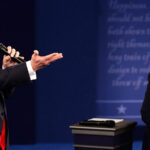Examining the “October Surprise”
With Election Day traditionally held during the first few days of November, October becomes a crucial campaigning month in the United States. The term “October Surprise” refers to new events or scandals that pop up during the last weeks or days of a campaign that can affect or shake up the outcome of the election. These “Surprises” can take the form of anything from orchestrated media events to unplanned natural disasters. While we may tend to think of these surprising scandals and crises as a recent development in politics, the “October Surprise” has actually been a feature of presidential campaigns as far back as 1800.
A Surprising History
The phrase “October Surprise” was actually coined in 1980 by William Casey, Ronald Reagan’s campaign manager during the 1980 presidential race. However, the tradition was a reality long before Casey named it. In the last weeks of the 1800 presidential race between Thomas Jefferson and incumbent John Adams, Alexander Hamilton published a 54-page letter that spoke out viciously against the president. His letter had the desired effect, and Jefferson won the election. In a more dramatic example, Progressive candidate Teddy Roosevelt was shot while delivering a speech in Milwaukee on October 14 during the 1912 presidential race. Though Roosevelt lived, he did not win the election.
More recently, the final days of the 2000 presidential race were marked with scandal when a news report revealed that candidate George W. Bush was arrested for drunk driving in 1976. And in 2012, President Obama’s campaign for reelection was boosted by the arrival of Hurricane Sandy at the end of October, which gave the American public the chance to see Obama providing humanitarian aid and support to affected areas and increased his popularity with voters.
An Unprecedented Month in an Unprecedented Race
Not quite so surprisingly, October has proven to be a dramatic month in the 2016 presidential election as well. On October 1, The New York Times revealed that Republican candidate Donald Trump took a $916 million tax write-off in 1995, which enabled him to avoid paying taxes for the following 18 years. Less than a week later, The Washington Post released an “Access Hollywood” tape of Trump making lewd and sexually-aggressive comments about women. And on the same day, Wikileaks publicized thousands of hacked emails sent by Democratic candidate Hillary Clinton’s campaign chair, John Podesta.
The release of the hacked emails seems to have done little to affect the momentum of Secretary Clinton’s campaign. But that may be because the released Trump recording has had such a dramatic effect on his attempts to appeal to women and girls. The public’s negative response to Trump’s statements also has caused many other Republican officials and candidates to withdraw their support of Mr. Trump, making his campaign from here on out an uphill battle.
However, with more than two weeks to go until the election, the only thing that seems certain is the likelihood that even more October “surprises” are right around the corner.



